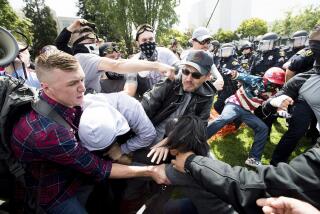S. Africa Drops 2 Terror Cases in Step to End Political Trials
- Share via
JOHANNESBURG, South Africa — Taking the first step toward ending political trials in South Africa, the government granted unconditional amnesty late Monday to a white right-wing extremist charged with bombings and weapons theft and to six African National Congress members on trial for terrorism.
Justice Minister Kobie Coetsee, announcing the actions, sought to reassure South Africans that the defendants in the two cases are not a threat to public safety.
“Although the charges reflect serious offenses . . . no serious bodily injuries were sustained by any person,” Coetsee said.
The move will free Piet (Skiet) Rudolph, the bearded leader of Orde Boervolk, or Order of the Boer People. Rudolph, whose nickname means “to shoot,” was arrested in September in connection with the April, 1990, theft of a cache of arms from air force headquarters in Pretoria. He also faced charges of planting bombs that damaged two offices of the ruling National Party, the offices of a government-supporting newspaper and a museum where the Afrikaners surrendered to the British at the end of the Anglo-Boer War.
Coetsee’s decision also ended the two-year-old Cape Town terrorism trial of Tony Yengeni, Jennifer Schreiner and four others. The state had charged the six, as members of the ANC’s military wing, with planting two bombs in 1987, conspiracy to plant other bombs and illegally possessing firearms and explosives.
For months, right-wing leaders have urged amnesty for Rudolph and his associates. Rudolph staged two hunger strikes in jail and was said to be near death when he resumed eating last month after receiving unspecified assurances from the government.
And, on the left, the ANC has demanded that the government end all political trials and release political prisoners by April 30, as the government promised in an August accord with the ANC.
In addition to granting the amnesties, Coetsee announced the early release of 33 prisoners, including two under life sentences. He said that brought the total number of political prisoners released to 310; the ANC estimates there are 2,500 political prisoners.
Coetsee said the underlying message of the decisions was that, as President Frederik W. de Klerk said last year, the country should “let bygones be bygones.”
Right-wing leaders welcomed the government’s decision.
Robert van Tonder, leader of the Boer People’s Party and a close ally of Rudolph, said that “for the first time the government . . . has given recognition to the Boer’s freedom struggle.” The Boers, or Afrikaners, are descendants of the Dutch, French and German settlers who arrived in South Africa three centuries ago.
More to Read
Sign up for Essential California
The most important California stories and recommendations in your inbox every morning.
You may occasionally receive promotional content from the Los Angeles Times.












